Key takeaways:
- Fitness cryptocurrency rewards motivate individuals by converting fitness achievements into tangible financial incentives, enhancing community engagement in wellness activities.
- Blockchain technology ensures secure, immutable data handling, empowering individuals with better control over their personal health information while enhancing trust among healthcare providers.
- Real-time monitoring through blockchain can facilitate efficient chronic disease management by enabling timely interventions based on accurate patient data.
- Challenges in implementing blockchain include system integration, educating users about the technology, and addressing data privacy concerns to ensure secure health information management.
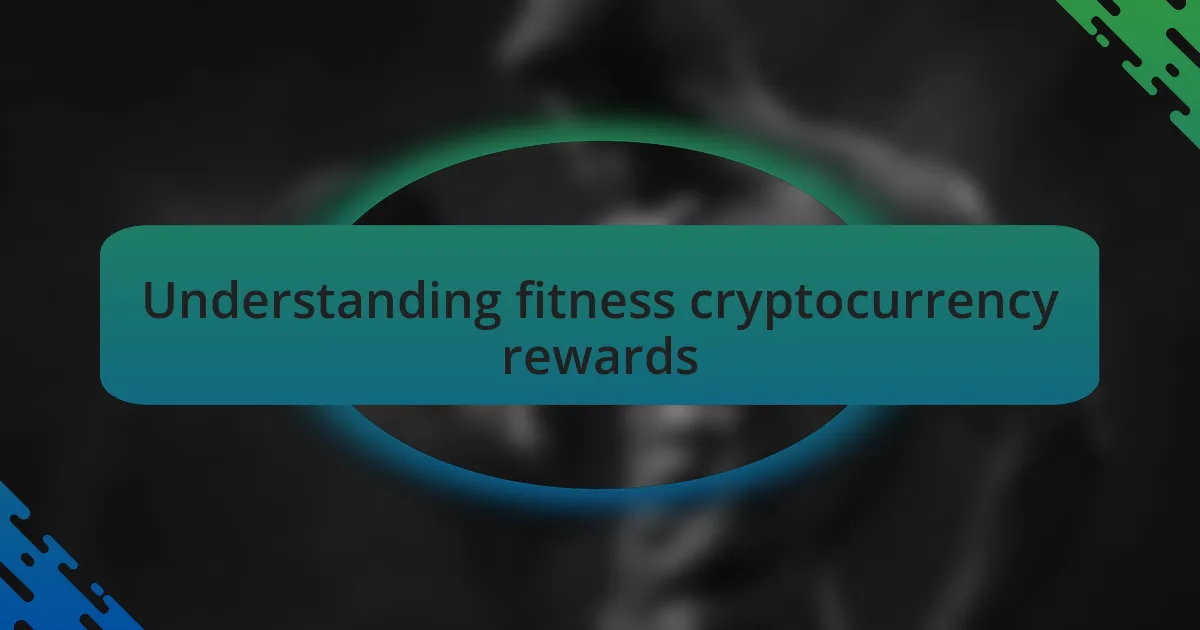
Understanding fitness cryptocurrency rewards
Fitness cryptocurrency rewards represent a fascinating intersection of wellness and technology. I remember the first time I earned crypto for hitting my fitness goals; it felt like my hard work was being recognized in a whole new way. Isn’t it motivating to know that each step you take or calorie you burn could lead to financial perks?
Understanding how these rewards function is crucial. Essentially, they operate on a blockchain system that ensures security and transparency. I found it empowering to see how my fitness data, securely stored and verified, translates directly into tangible rewards. Have you ever thought about how this could change the landscape of fitness motivation?
What I appreciate about fitness cryptocurrency rewards is the potential for community engagement. By participating in challenges or group activities, you not only earn rewards, but also build connections with like-minded individuals. Think about it: earning crypto while fostering relationships can create a supportive environment that enhances our fitness journeys.
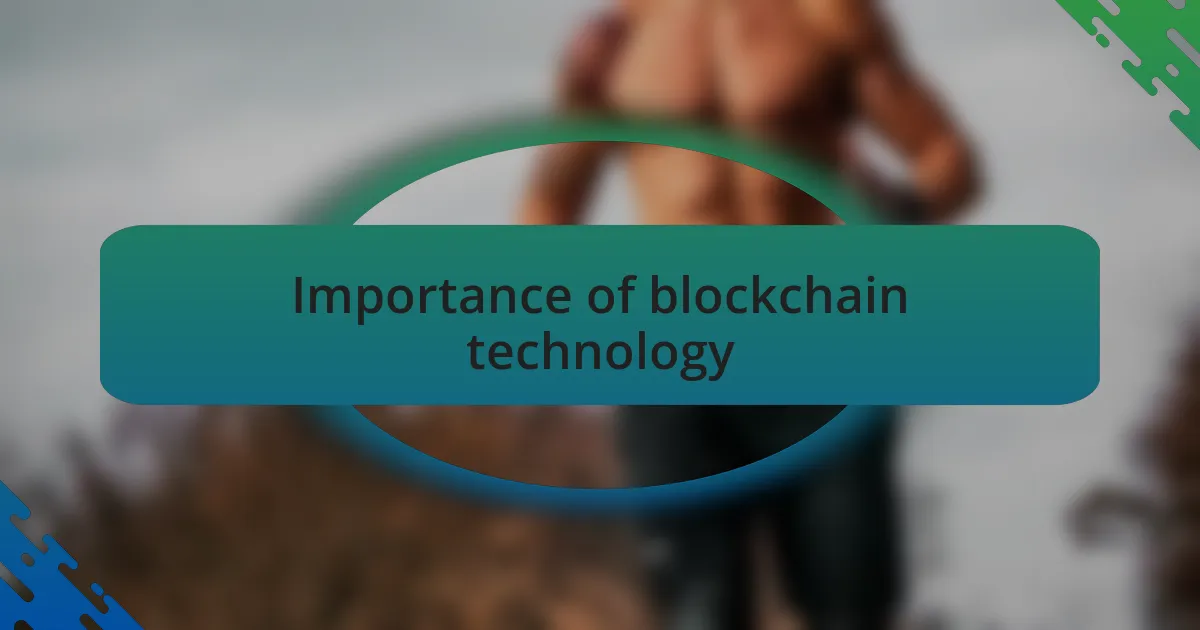
Importance of blockchain technology
Blockchain technology plays a pivotal role in transforming how we handle and secure data in various sectors. I recall a moment when I realized its true potential: the immutable nature of blockchain means that once data is entered, it cannot be altered. This feature not only enhances trust but also ensures that my personal health records remain accurate and accessible only to those I authorize. Have you ever worried about the accuracy of your health data?
Moreover, the decentralized aspect of blockchain empowers individuals by giving them control over their own information. I find it incredibly refreshing to think that my health records could be stored in a way that minimizes exposure to breaches. This shift not only increases the security of our personal data but also fosters a sense of ownership. Isn’t it reassuring to know that we could take charge of our own health narratives?
Lastly, the transparency provided by blockchain can lead to improved health outcomes. Through it, providers can share crucial information while safeguarding patient privacy, ensuring everyone benefits from up-to-date and verified health insights. I find it inspiring that with blockchain, collaboration in healthcare can happen more seamlessly. How do you think this could enhance your own experience with managing a chronic disease?
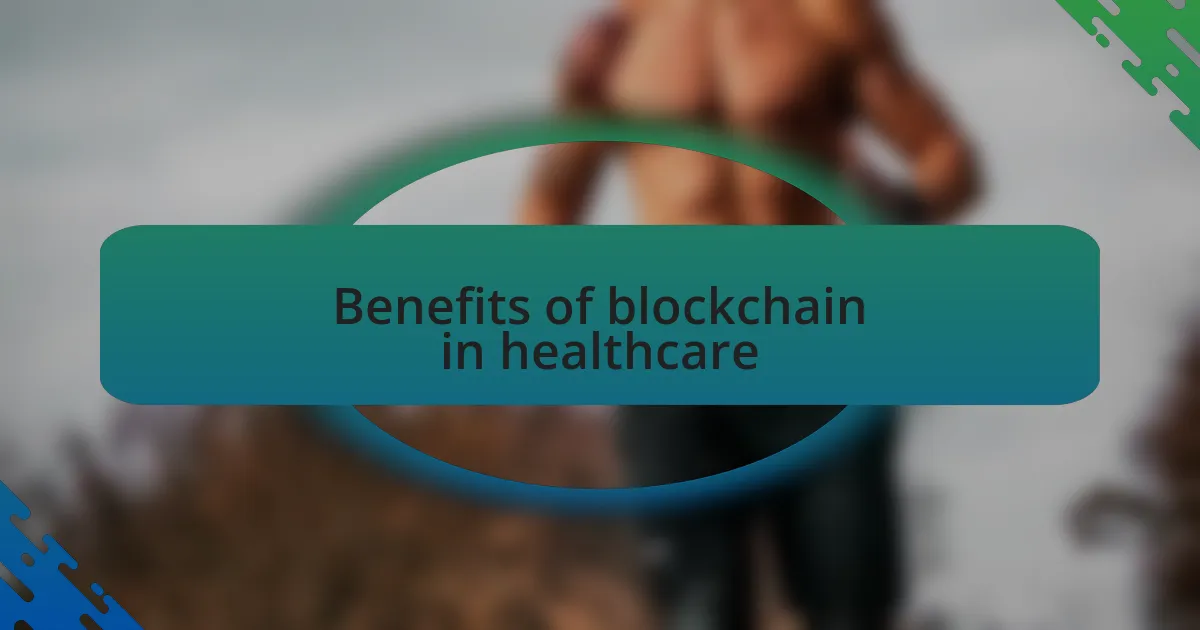
Benefits of blockchain in healthcare
The ability of blockchain to enhance data interoperability in healthcare is a game changer. I remember a situation where I had to gather multiple health records from different providers, and it was a tedious process. With blockchain, data can be shared securely across various systems without compromising privacy, making my healthcare experience smoother and more efficient. Don’t you wish accessing your medical history could be that easy?
One of the most exciting benefits of blockchain is its potential to reduce fraud and errors in healthcare transactions. From my perspective, seeing discrepancies in billing or insurance claims can be incredibly frustrating. The transparent ledger of blockchain holds everyone accountable, ensuring that each transaction is accurate and verifiable. Can you imagine the peace of mind that would come from knowing that your claims are handled correctly every time?
Additionally, blockchain can facilitate real-time monitoring of chronic conditions. I think back to a family member managing diabetes, who often struggled with tracking their daily data. With blockchain, healthcare providers could access real-time updates on patient metrics, allowing for timely interventions. How would that kind of immediate feedback change your approach to managing a chronic health issue?
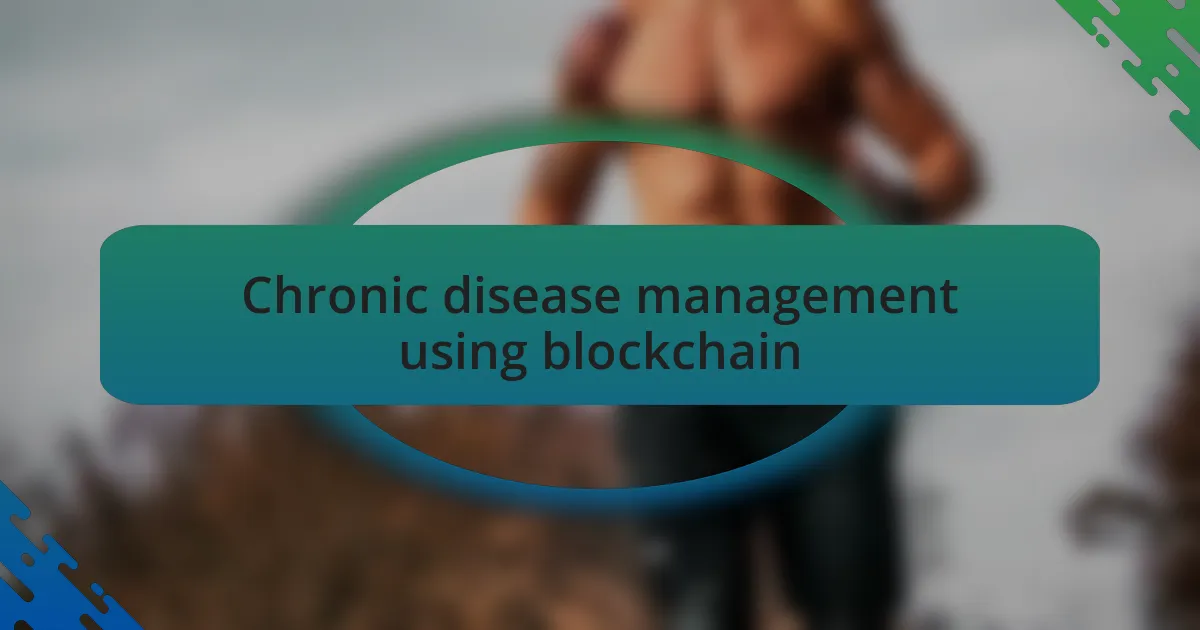
Chronic disease management using blockchain
Managing chronic diseases can often feel overwhelming, but I’ve found that blockchain technology presents a unique solution in this realm. Imagine having all your health data securely stored and instantly accessible, regardless of where you receive care. I recall visiting a specialist who needed my previous test results, and it took ages to get them sent over. With blockchain, that delay could vanish entirely, enabling seamless transitions between providers and improving continuity of care. Wouldn’t it be a relief to have your medical history just a click away?
In my experience, one significant challenge in managing chronic conditions is the adherence to treatment plans. I once struggled to stick to my medication schedule due to occasional forgetfulness. However, blockchain allows for secure and transparent tracking of medication usage and appointments, fostering accountability. By utilizing smart contracts—self-executing agreements on the blockchain—patients could receive reminders tailored to their specific schedules. How much simpler would it be to manage your care with that level of organization?
Another aspect that excites me about blockchain in chronic disease management is its potential for patient empowerment. When I took control of my own health data, I felt a newfound sense of responsibility. Blockchain gives patients ownership of their information, allowing them to share it selectively with healthcare providers or researchers. This personalized approach could lead to more targeted treatments based on real-world data. Wouldn’t you feel more engaged in your health journey if you knew precisely how your data was being used to improve your care?
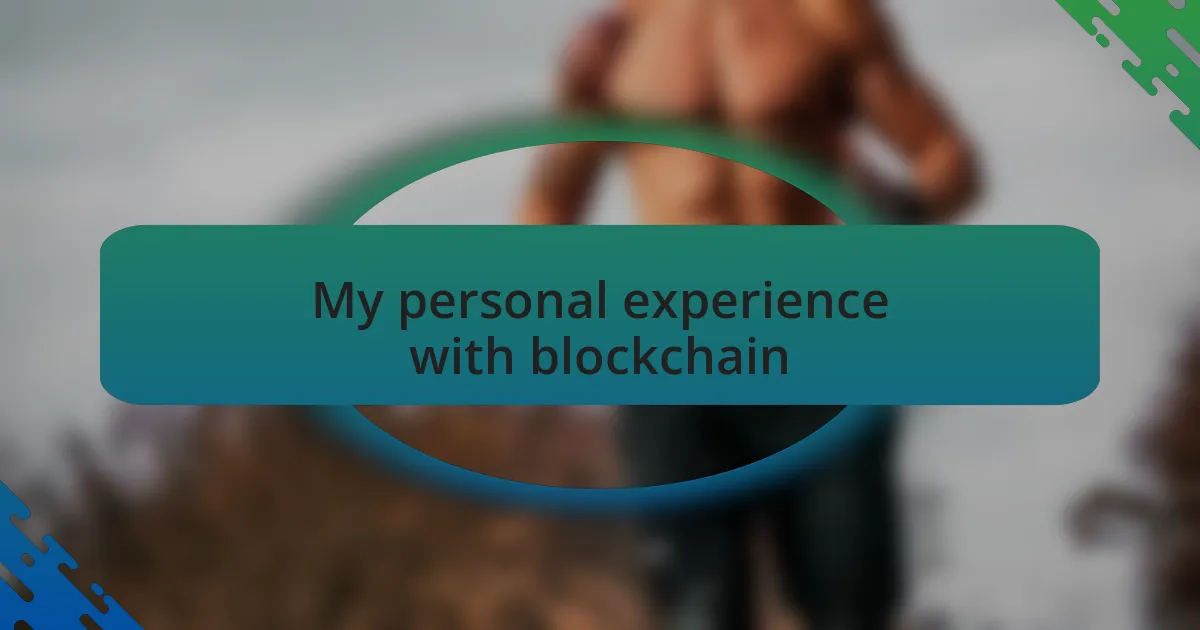
My personal experience with blockchain
During my journey into blockchain technology, I was genuinely amazed by its transformative capabilities. I often thought about the numerous times I felt lost in a sea of medical records, trying to piece together my health history. When I finally grasped the concept of decentralized data storage, it was like finding a compass in that chaotic landscape—there was suddenly clarity at my fingertips.
A memorable moment was when I participated in a blockchain pilot program for chronic disease management. It was exhilarating to see my medication adherence tracked in real-time, providing me with insights like never before. I could visually track my progress, and it felt empowering to know that I was in control of my treatment. Have you ever experienced the thrill of taking ownership of your health? It’s a game-changer.
Reflecting on my interactions with healthcare providers, I noticed a significant change when using blockchain. There was less back-and-forth communication, which often drained my energy. Instead, I found that my doctors had real-time access to my data. It made our conversations feel more relevant and focused. I couldn’t help but wonder—how much more effective could chronic disease management be if every patient had this level of access and insight?
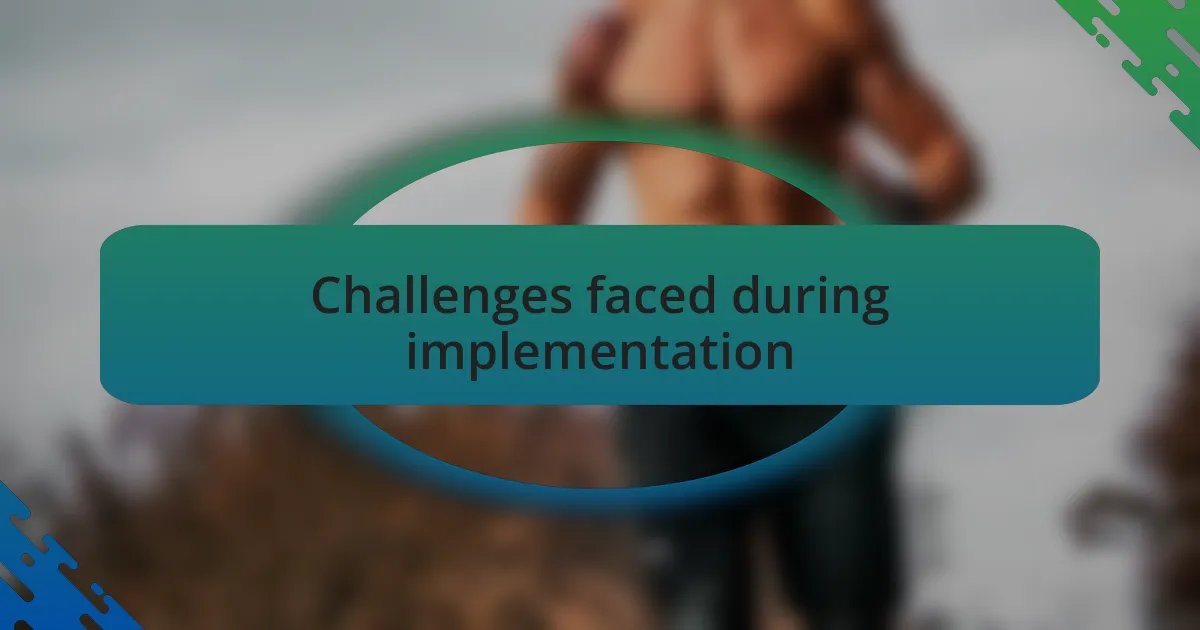
Challenges faced during implementation
Implementing blockchain for chronic disease management certainly came with its hurdles. One challenge I faced was the integration of existing health systems with blockchain technology. I still remember the frustration of trying to get my previous medical records onto a new, decentralized platform. It felt like climbing a steep hill—every step forward revealed additional complexities that needed to be resolved.
Another significant obstacle was the education gap among both patients and healthcare providers. I often found myself explaining the benefits of blockchain to my doctors, who were initially skeptical. It made me wonder: how can we expect innovation to thrive if we don’t invest time in understanding it? Bridging this knowledge gap was essential for making the technology genuinely effective.
Moreover, data privacy is a pressing concern that loomed over my experiences. With the shift towards decentralized data management, I constantly questioned how secure my sensitive health information would be. The fear of potential breaches made me cautious, reminding me that as revolutionary as blockchain is, the responsibility of protecting patient data is paramount. How do we strike a balance between innovation and security in such a delicate field?